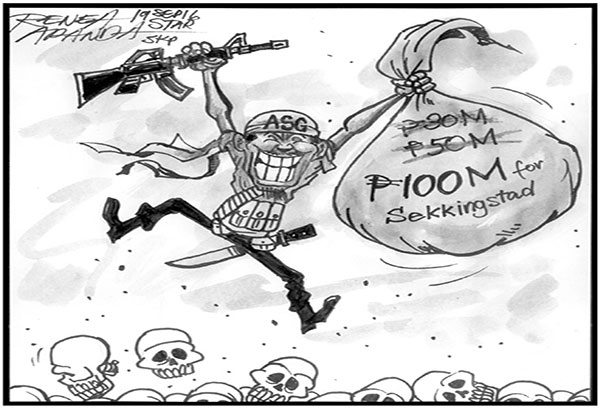
In an unguarded moment recently, President Duterte himself blurted out on national television that “50 million” had already been paid. This was amid rumors at the time that the Abu Sayyaf had beheaded another captive, Norwegian Kjartan Sekkingstad, who was kidnapped from a resort he was managing on Samal Island in Davao on Sept. 21 last year.
It was unclear if the President meant 50 million in pesos or US dollars. The Abu Sayyaf had initially demanded $6.3 million for each of its three foreign hostages, according to previous reports. Yesterday, amid reports in Mindanao that the actual ransom amount was P100 million, Malacañang officials said they did not know who might have paid any ransom – whether the victim’s family or a foreign government.
The Philippine government supposedly has a no-ransom policy, and the Armed Forces yesterday attributed the Norwegian’s release to relentless military pursuit operations.
In reality, for many years now, kidnapping for ransom has become the most lucrative industry in Sulu and Basilan. Many of the payments are in foreign currency, which makes you wonder how the money is handed over, stashed and spent. In the kidnapping of 21 mostly European hostages from the Malaysian island resort of Sipadan in April 2000, the Abu Sayyaf allegedly received at least $20 million in “development aid” from Libya and another $3 million from Malaysia in exchange for the hostages. No ransom payment has ever been recovered.
You can’t hide that kind of money under a mattress or in a cave. It has to be deposited somewhere. Philippine banks are required to report to monetary authorities any large deposits. Dollars have to be converted to Philippine pesos to be spent here. How is ransom money laundered, and who are involved? The laundering is clearly thriving as much as the kidnapping itself.
At least Sekkingstad is alive, unlike the two other foreigners snatched with him in Samal, Canadians John Ridsdel and Robert Hall, who were beheaded. But ransom is the best incentive for staging more kidnappings. Paying ransom is fine as long as it leads to the capture of the kidnappers and eventual recovery of at least some of the money. In the case of the Abu Sayyaf, ransom payments have simply bred impunity.
http://www.philstar.com/opinion/2016/09/19/1625195/editorial-lucrative-business

No comments:
Post a Comment
Note: Only a member of this blog may post a comment.